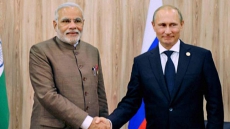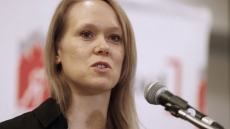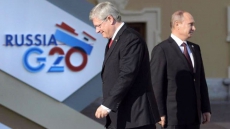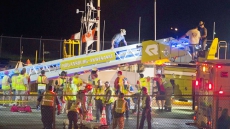A man was beheaded and several others injured on Friday in a suspected Islamist attack on a gas factory in Isere, in the Rhone-Alps region of France, which was declared a "terrorist" act by President Francois Hollande, media reports said.
Several small explosive devices were also set off at the Air Products factory in Saint-Quentin-Fallavier, near the French city of Lyon, and the alleged attacker was said to have been carrying an Islamist flag, which was found nearby, Xinhua reported citing sources.
One person who had no ID papers and has refused to speak to anti-terrorism police was arrested, officials said.
Hollande, who was in Brussels for a European Council meeting, declared it a "terrorist" attack and was returning to Paris to head an emergency meeting of the security committee following the deadly attack.
French Defence Minister Jean-Yves Le Drian confirmed that Hollande would meet the concerned ministers and top military and security chiefs at 3 p.m.
"Unfortunately, a new terrorist attack occurred," Le Drian was quoted as saying by local media.
According to French newspaper Le Dauphine Libere, a man was seen driving back and forth in front of the target building earlier in the day.
Prime Minister Manuel Valls has ordered tight security nationwide.
According to earlier reports by The Local news portal, apart from the decapitated man, several others were also injured in the attack.
In a statement, Paris Prosecutor Francois Molins, said a probe was ordered for murder and attempted murder in an organised group in relation to terrorism, and added that anti-terrorism police was investigating the attack.
Alain Juppe, the mayor of Bordeaux, condemned the attack in a tweet.
"The terrorist threat is at a maximum," he said, adding that France "must make every effort to protect its citizens".
25 KILLED IN KUWAIT MOSQUE EXPLOSION, ISLAMIC STATE CLAIMS HAND

At least 25 people were killed and at least 202 others wounded on Friday in a suicide bomb attack on a Shia mosque which the Islamic State (IS) militant group claimed responsibility for, media reports said.
The blast rocked the Imam Al-Sadeq Mosque, located in the busy neighbourhood of al-Sawabir of the capital city, Xinhua reported citing the official Kuwait News Agency.
Kuwait's interior ministry said that 25 people were killed and at least 202 others were injured in the blast, which occurred when a large number of Muslims were offering Friday prayers inside the Mosque.
Kuwaiti Emir Sabah Al-Ahmad Al-Jaber Al-Sabah visited the mosque, located just a few buildings away from the country's interior ministry.
An emergency session of parliament has also been called, an Al Jazeera report said.
Meanwhile, Saad al-Ajmi, Kuwait's former information minister, told Al Jazeera that the attack was a reminder that no country was "immune from terrorism".
Ajmi said Kuwait had "a good record" in its relationship between Sunni and Shia groups, and was a small country with good security without widespread dissent.
However, if a group was responsible, he said: "I think that those who want to tip the whole region ablaze in a sectarian war would be behind this attack because that is their agenda."
The attack was designed to threaten national security, and break national unity, said Yaaqoub al-Sanae, Kuwait's minister of Awqaf and Islamic affairs.
"Kuwait will remain an oasis of security for all groups of Kuwaiti society and all sects. The government is taking many procedures to protect prayers and mosques," al-Sanea told Kuwait's state news agency KUNA.
The explosion was the first suicide bombing attack on a Shia mosque in the Gulf Arab state, where Sunnis and Shia live side by side with little apparent friction.
If proven to be true, then it was not the first time for the IS group to plot and carry out such attacks against Shia mosques. It has claimed responsibility for bombings at two different Shia mosques in neighbouring Saudi Arabia in recent weeks.
On March 20, IS suicide bombers also attacked two mosques in Yemen's capital Sanaa and Houthi headquarters in the northern Saada province, killing at least 137 people in the attacks, the most deadliest in Yemen for decades.
Casualties were expected to grow as Friday prayers have always been the most attended of the week, while the number of people joining the prayers would increase during the Muslim holy month of Ramadan that started on June 18 in the Gulf countries.
GUNMEN KILL 37 IN ATTACK ON TUNISIAN BEACH HOTEL

At least 37 people, mostly foreigners, were killed and 36 others injured on Friday when gunmen opened indiscriminate fire in Tunisia's resort town of Sousse, the country's interior ministry said.
Tunisia's Interior Ministry told NBC News that most of the victims were foreigners and that at least 37 people had been injured in the attack on the beaches of Sousse.
The ministry said one gunman had been killed and a second captured following a security-forces operation in the popular seaside resort.
A Tunisian student from Kairouan, armed with a Kalashnikov rifle, led the attack inside a hotel. He was killed soon after opening fire in retaliatory action by security personnel, Xinhua reported citing the Interior Ministry.
The city of Sousse, 140 km south of capital Tunis, is one of the most prominent tourist destinations in the country. Since the Arab Spring revolution, there was one terrorist attempt outside a hotel in the region.
The Islamic State militant group had called on its followers to increase attacks during the Islamic fasting month of Ramadan, but no one has yet claimed responsibility for Friday's attack.
An attempt at achieving higher casualties failed when the suicide bomber prematurely detonated his device before even reaching the hotel gate.
The North African nation has been battered by militant attacks. In March, two Tunisians returning from Libya killed 22 people at the national Bardo Museum.




